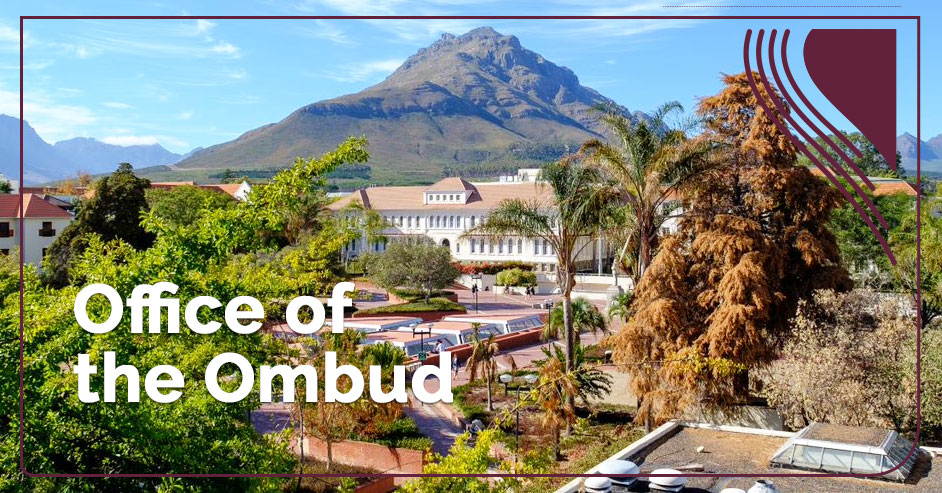
The Office of the Ombud at Stellenbosch University provides a channel for student, parent and staff problems and complaints to be given appropriate attention where the existing University structures are unable to deal with these issues satisfactorily through the normal channels, or where existing structures appear to be inadequate.
Defining ‘Ombud’
‘Ombud’ comes from the Nordic terms ombudsman, ombudsmann and ombudsmand, all of which mean ‘the citizens’ defender’. Over time, it has come to refer to a person who helps individuals or groups resolve conflicts or concerns.
The Office of the Ombud at Stellenbosch University is an independent, neutral and confidential space for people to discuss their issues relating to the University. The Ombud is an independent person appointed to facilitate the informal resolution of such concerns. This typically happens through discussion, mediation and recommendations. Having an Ombud’s Office
benefits the University in many ways.
Where does the
Ombud fit in?
The Ombud does not replace existing University structures; instead, the Ombud complements these structures. Therefore, complainants must first exhaust all prescribed University procedures before involving the Ombud. Only if their problem remains unresolved after a reasonable period has expired, complainants may turn to the Ombud. If the available channels have not been explored thoroughly, complainants will be referred back to those channels.

Who may lodge a complaint or query with the Ombud?
Any Stellenbosch University employee, student, parent of a student, alumnus, visitor and service provider may approach the Ombud if:
- they feel that they have been treated unfairly;
- they are unsure which policies or procedures apply to their problem;
- they are unsure how to resolve a complicated issue;
- they need an impartial listener who will observe confidentiality;
- they need a neutral mediator to resolve a problem;
- they have a complaint, or wish to discuss a sensitive concern; and
- they have exhausted all prescribed internal processes, but still feel dissatisfied with how the matter was handled.
Note, however, that the Office of the Ombud has sole discretion to decide whether or not to deal with a complaint or problem, and how.
How can the office of the Ombud help you?
The Office of the Ombud at Stellenbosch University may assist by:
- hearing concerns and helping to clarify them;
- providing a safe and confidential forum to voice problems;
- analysing the problem and identifying options;
- setting out the available channels;
- providing neutral advice while protecting confidentiality;
- expediting matters that have been unduly delayed;
- redirecting complainants to other offices better suited to mediate the issue;
- helping to identify underlying issues;
- exploring different solutions through both formal and informal channels;
- helping parties resolve disputes; and
- making recommendations for change.
What can the office of the Ombud not help you with?
It falls outside the ambit of the Ombud at Stellenbosch University to:
- make decisions on the University’s behalf;
- determine or overrule University policies or procedures;
- intervene if the complaint can be pursued as a grievance according to established University procedure;
- accept notifications on behalf of the University or any party;
- consider complaints that are already the subject of a lawsuit;
- give legal advice or provide psychological counselling;
- award compensation;
- represent any party;
- handle matters of a purely academic nature; and
- attend to patently vexatious or frivolous complaints.
Is there any risk involved in consulting the Ombud?
No. The University guarantees that no one will suffer reprisal, discrimination or victimisation for seeking assistance from the Ombud. In terms of the South African Constitution, everyone is entitled to privacy, access to information, and just administrative action. The University and the Office of the Ombud respect these rights.
What are the core principles guiding the Ombud’s work?
The SU Ombud also adheres to the standards of practice and code of ethics of the International Ombudsman Association (IOA).
Independence and neutrality,
ensuring separate operations from University structures
Objectivity and impartiality
in hearing all parties’ views
Informality,
with no formal structures required
Promptness and efficiency
to facilitate faster solutions
Confidentiality,
pledging not to reveal anyone’s identity without their permission
Equality and fairness
as the primary driving force
Respect
for all parties’ dignity

